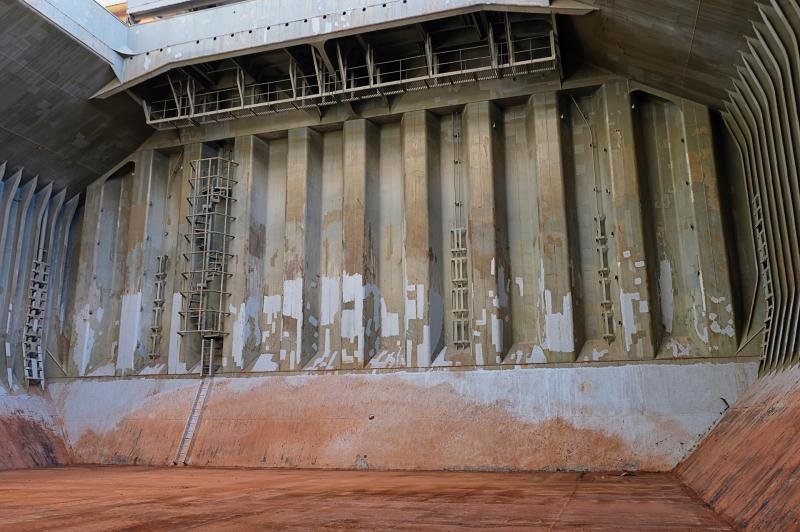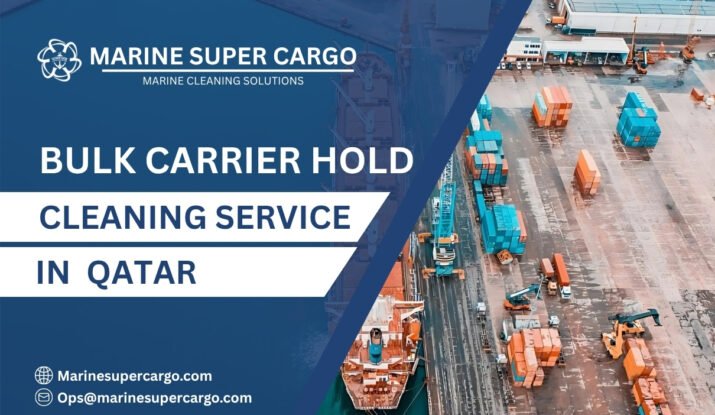Bulk cargo transportation plays a critical role in supporting Qatar’s dynamic trade and energy sectors. The country’s ports are vital links in the global maritime chain, handling immense volumes of dry bulk such as fertilizers, coal, iron ore, and agricultural commodities. In this demanding logistics environment, a professional Hold Cleaning Service in Qatar becomes indispensable for ensuring vessel safety, cargo integrity, and compliance with international regulations.
In recent years, Qatar’s growing maritime operations have placed increased attention on the importance of hold cleanliness in bulk carriers. Whether at Hamad Port or Mesaieed Port, shipowners must maintain pristine cargo holds to minimize contamination, avoid port detentions, and ensure successful cargo loading.
Professional Hold Cleaning Service in Qatar is not just a procedural formality—it’s an essential operation governed by global standards such as those established by the International Maritime Organization (IMO) and the MARPOL Annex V regulations. These frameworks enforce best practices in environmental protection, waste disposal, and operational safety.
Why Hold Cleaning is Crucial in Qatar’s Maritime Sector
Qatar’s maritime ecosystem is heavily involved in the export and import of dry bulk cargoes. A dirty hold can lead to cargo rejection, off-hire time, or even financial penalties. That’s why securing a reliable Hold Cleaning Service in Qatar is crucial before loading sensitive goods like grains, cement, urea, and mineral ores.
Cleaning holds between cargoes prevents cross-contamination, infestation, and corrosion. Regulatory inspections—especially before loading agricultural cargo—often require a cleanliness standard ranging from shovel clean to grain clean or hospital clean. Meeting these benchmarks calls for expert execution using appropriate tools and cleaning methods.

Ports Covered Under Hold Cleaning Service in Qatar
The major Qatari ports handling bulk carriers include:
- Hamad Port – Qatar’s largest port with state-of-the-art facilities for dry bulk and general cargo.
- Mesaieed Port – Key industrial port specializing in petrochemical and bulk trade.
- Doha Port – Used for cruise ships and general shipping.
Professional teams operating in Qatar provide hold cleaning across these ports, offering uniform service quality and regulatory adherence.
Methods Used in Hold Cleaning Service in Qatar
A comprehensive Hold Cleaning Service in Qatar often involves several stages depending on the type of cargo residue and the next loading requirements. Methods typically include:
- Dry Cleaning: Removing loose residues using air blowers, scrapers, or manual sweeping.
- High-Pressure Water Cleaning: Effective against dried-on or sticky residues.
- Chemical Cleaning: Used when previous cargoes are oily, greasy, or require pH-neutralization.
- Rust Removal & Surface Treatment: Ensures no corrosion interferes with cargo loading or damages future goods.
- MARPOL-Compliant Waste Disposal: Sludge and wastewater are disposed of as per MARPOL 73/78 guidelines.
Equipment and Technology in Qatar
High-quality equipment ensures efficiency and safety during operations. The Hold Cleaning Service in Qatar often utilizes:
- Water cannons and hydroblasters (with pressures up to 500 bar)
- Marine-approved chemical agents
- Gas detectors to ensure safe atmospheres for confined space entry
- Dehumidifiers and ventilation systems to prepare holds for dry cargoes
These tools are operated by trained professionals who comply with safety protocols, risk assessments, and proper waste segregation.
Environmental & Regulatory Compliance
One of the most important aspects of Hold Cleaning Service in Qatar is compliance with national and international maritime regulations. Discharge of hold wash water is strictly monitored by Qatar’s port authorities in alignment with IMO and MARPOL guidelines.
Port inspections often include:
- Visual assessments
- Slop/sample testing
- Cleanliness certification
- Photographic documentation
Professional hold cleaning service providers keep meticulous records and ensure that all waste is disposed of via authorized port reception facilities.
Pre- and Post-Cleaning Inspections
Before any operation begins, a detailed inspection is conducted to assess the type and extent of residue. The process includes:
- Documenting previous cargo history
- Evaluating coating condition and surface corrosion
- Verifying ballast tank conditions
- Assessing risk areas like ladders, manholes, and bulkheads
Post-cleaning, a thorough inspection ensures the hold meets the agreed standard (grain clean, hospital clean, etc.), documented via photographs and cleaning reports.
Cargo Hold Preparation for Specific Cargo Types
Different cargo types require different preparation techniques:
- Grain & Food Commodities: Need “grain clean” standards with no traces of dust, scale, rust, or previous cargo.
- Fertilizers: Require residue-free, dry surfaces to prevent chemical reactions.
- Cement Clinker & Coal: Hold cleaning must eliminate dust and hardened material using both dry and wet methods.
An expert Hold Cleaning Service in Qatar customizes its approach based on cargo requirements, vessel type, and port conditions.
Challenges and Solutions in Qatar’s Climate
Qatar’s high temperatures and humidity can affect cleaning schedules and drying time. Challenges include:
- Longer drying periods
- Risk of mold or rust during downtime
- Need for ventilation post-cleaning
Advanced equipment like industrial dehumidifiers and hot air blowers is used to maintain efficiency. Professionals also use anti-corrosive treatments to minimize climate impact.
Operational Efficiency and Turnaround Time
Quick turnaround is critical in port logistics. Professional Hold Cleaning Service in Qatar emphasizes:
- Round-the-clock availability
- Trained multi-skilled teams
- Rapid mobilization from service hubs near the port
- Transparent documentation and reporting
These efficiencies help shipowners meet tight schedules, reduce laytime, and avoid demurrage.
Image Suggestions and Captions:
- Image: Bulk Carrier in Doha Port
Caption: Bulk carrier preparing for dry cargo at Doha Port after hold cleaning. - Image: High-pressure water blasting
Caption: Technicians using high-pressure water jets for hold cleaning in Hamad Port. - Image: Empty cargo hold post-cleaning
Caption: A “grain clean” cargo hold ready for loading at Mesaieed Port.
FAQs – Hold Cleaning Service in Qatar
Q1: Why is hold cleaning necessary in Qatar?
Hold cleaning ensures that cargo holds are free from contaminants, rust, and residues that could damage or compromise the quality of the next cargo. In Qatar, where dry bulk trade is significant, clean holds are essential for regulatory compliance and cargo safety.
Q2: What standards must be followed for hold cleaning?
Hold cleaning in Qatar adheres to international standards established by the IMO and the MARPOL Annex V, as well as port authority inspections.
Q3: How long does a typical hold cleaning take in Qatari ports?
Cleaning duration depends on the vessel’s size and previous cargo. However, professional services in Qatar offer quick mobilization and 24/7 support to minimize downtime.
Q4: Are cleaning chemicals safe for the environment?
Yes, eco-friendly and MARPOL-compliant chemicals are used, and all waste is disposed of through approved facilities.
Q5: Which ports in Qatar offer hold cleaning services?
Services are available in Hamad Port, Mesaieed Port, and Doha Port.
Contact Us
For reliable and professional Hold Cleaning Service in Qatar, please contact:
Email: ops@marinesupercargo.com
Website: marinesupercargo.com
Phone: +91 7080050720


